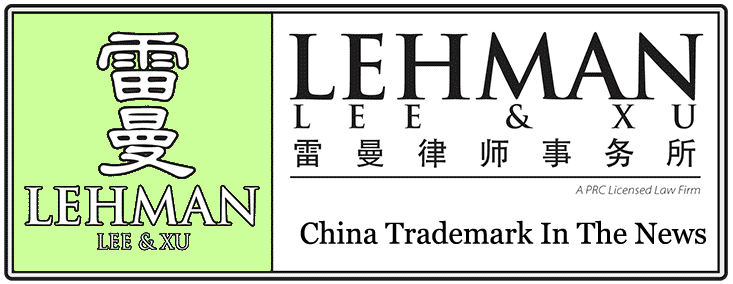In the amended draft of the Trademark Law considered by the 11th National People’s Congress Standing Committee at the end of December, it is put forward that efforts will be made to strengthen protection of the rights to exclusive use of trademarks, add provisions on punitive compensation, and raise the amount of compensation for infringement.
In view of the fact that currently the cost of protecting trademark rights is so high that often the compensation for infringement awarded to the right holder cannot offset the damages sustained, the amended draft has introduced a punitive compensation system providing that in serious cases of malicious infringement of rights to exclusive use of a trademark, the amount of compensation for infringement can be set at one to three times the amount of actual losses suffered by the right holder, the proceeds obtained by the infringer, or the licensing fees of the registered trademark. The draft also sets out that in cases where all the above-mentioned three bases cannot be established, the court can at its discretion raise the maximum statutory compensation amount from Rmb500,000 to Rmb1 million.
Moreover, the draft has increased the types of registered trademark infringements which are legally liable. The draft provides that any acts of deliberately facilitating infringement and assisting other parties in infringing the exclusive right to use a registered trademark constitute acts of trademark infringement.
To maintain market order for fair competition, the draft has added provisions prohibiting acts of “free riding on brands” and malicious trademark registration. Such activities have been rife in recent years.
With such cases as the iPad war between Apple and Proview, trademark preemptive registration of Lin Shuhao (Jeremy Lin), and NBA superstar Michael Jordan’s lawsuit against Qiaodan Sports Co Ltd (the Chinese characters for “Jordan” and “Qiaodan” are the same), trademark infringement has become the focus of attention recently.
To prevent malicious trademark preemptive registration, the draft prohibits the preemptive registration of trademarks by people who have knowledge about the prior use of the trademark through business dealings. The draft also stipulates that no approval will be given to any application for registration of trademarks which are already in use and the applicant has knowledge about the prior use of the trademark through having a contract, business dealings or other relations with the trademark holder.
To address the act of “free riding on brands” whereby people use other people’s trademark as their enterprise name, the draft provides that such cases, which mislead the public and constitute unfair competition, will be handled in compliance with the Anti-Unfair Competition Law.
According to statistics, up to the first half of 2012, the cumulative number of trademark applications in China topped 10.54 million, the cumulative number of successful registrations reached 7.17 million, and the number of valid trademark registrations was 6.09 million. All these figures rank first in the world.
China’s Trademark Law underwent two rounds of amendment since it was first promulgated in 1983.
http://china-trade-research.hktdc.com/business-news/article/China-Investment-Environment/China-to-revise-Trademark-Law-to-raise-compensation-for-infringement/bacn/en/1/1X3A3JLU/1X09R0HJ.htm
|

